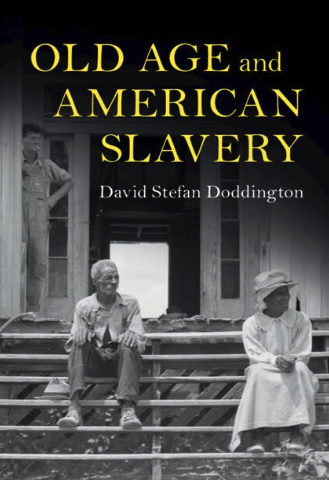Global Slaveries, Fugitivity, and the Afterlives of Unfreedom: Interconnections in Comparative Dialogue
12 October 2023It was to my great shock (and delight) that I was invited to participate in the Sawyer Seminar, “Global Slaveries, Fugitivity, and the Afterlives of Unfreedom: Interconnections in Comparative Dialogue,” funded by the Mellon Foundation, at Indiana University, Bloomington, US, in the autumn (Fall( semester, 2023/24.
 The timing of this in the first week of teaching was not exactly perfect – and with thanks to colleagues/students who have covered for me – but this was simply too great an honor to turn down. I’m incredibly fortunate (and convinced they’ve mistaken me for someone else…) to be included as one of “eight eminent scholars [who] will deliver lectures addressing various aspects about how gender and processes of racialization have indelibly shaped histories of slavery around the world.” I’ll be presenting on elements of my most recent book, Old Age and American Slavery, and focusing directly on issues associated with age, gender, and slavery.
The timing of this in the first week of teaching was not exactly perfect – and with thanks to colleagues/students who have covered for me – but this was simply too great an honor to turn down. I’m incredibly fortunate (and convinced they’ve mistaken me for someone else…) to be included as one of “eight eminent scholars [who] will deliver lectures addressing various aspects about how gender and processes of racialization have indelibly shaped histories of slavery around the world.” I’ll be presenting on elements of my most recent book, Old Age and American Slavery, and focusing directly on issues associated with age, gender, and slavery.
In the lecture I look to address how enslavers and enslaved people in the US South adapted to, resisted, or failed to overcome changes associated with aging, both real and imagined. I show the extent to which these struggles ran alongside, and intersected with, notions of race and gender. By doing so, I complicate notions of static hierarchies among Black and white southerners, insist on the necessity of incorporating age as a category of analysis and as a relation of power, and address the contingent networks of solidarity forged in bondage. Age shaped slavery, both as a system of economic exploitation and a contested site of personal domination, in crucial ways. Albeit never on equal terms, both enslaver and enslaved had to grapple with the realization that “old age [was] creeping on me so fast,” and their efforts to do so were entwined in the wider struggles within and against slavery. The “ravages of time” came for all; recognition of this simple fact shaped the dynamics of American slavery, and the lives of enslaved people and enslavers alike.
If you want to know more about the research of Dr Doddington into old age and American slavery, see Dr David Doddington – People – Cardiff University.
Dr David Doddington is Senior Lecture in North American History at Cardiff University.
- American history
- Central and East European
- Current Projects
- Digital History
- Early modern history
- East Asian History
- Enlightenment
- Enviromental history
- European history
- Events
- History@Cardiff Blog
- Intellectual History
- Medieval history
- Middle East
- Modern history
- New publications
- News
- Politics and diplomacy
- Research Ethics
- Russian History
- Seminar
- Social history of medicine
- Teaching
- The Crusades
- Uncategorised
- Welsh History